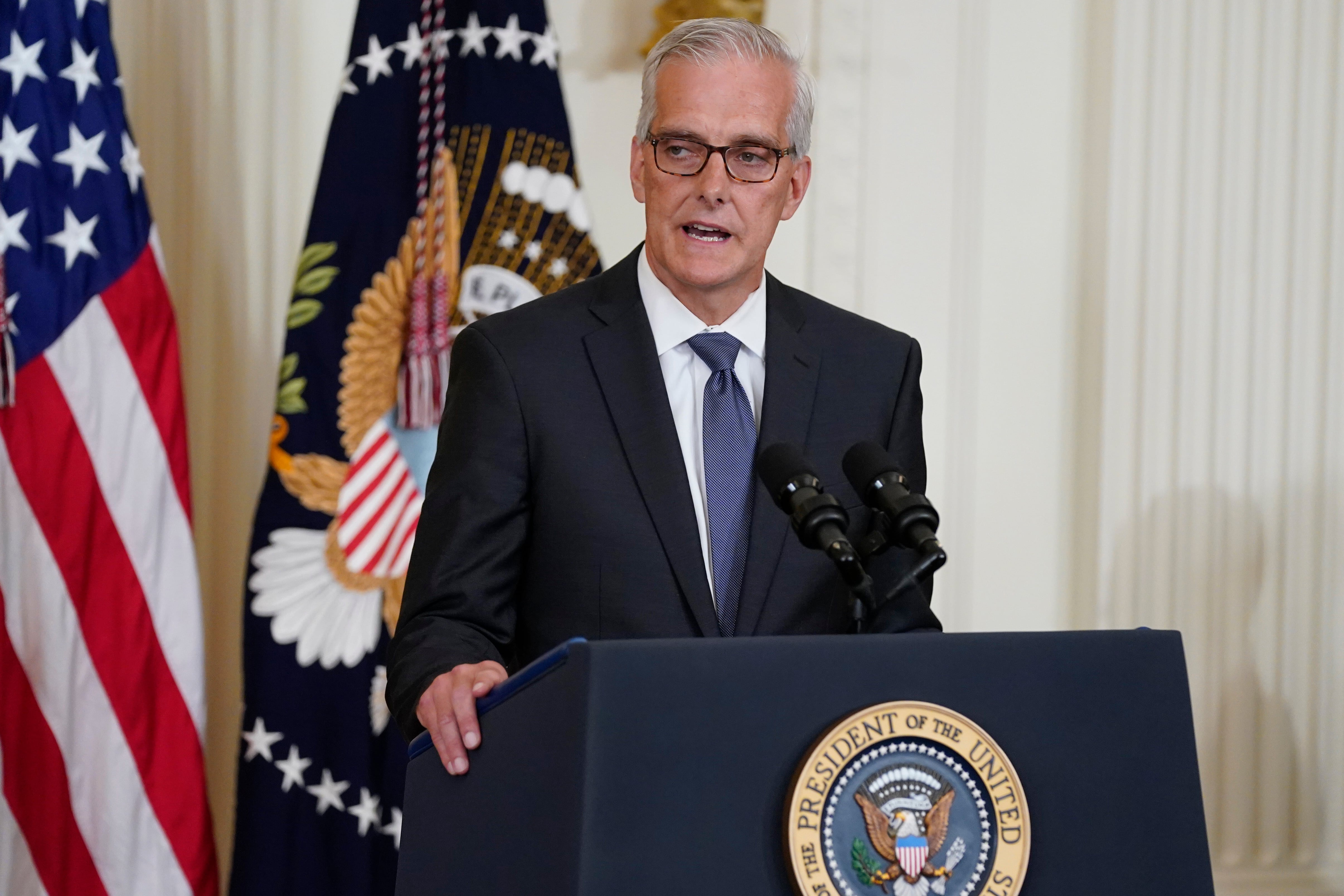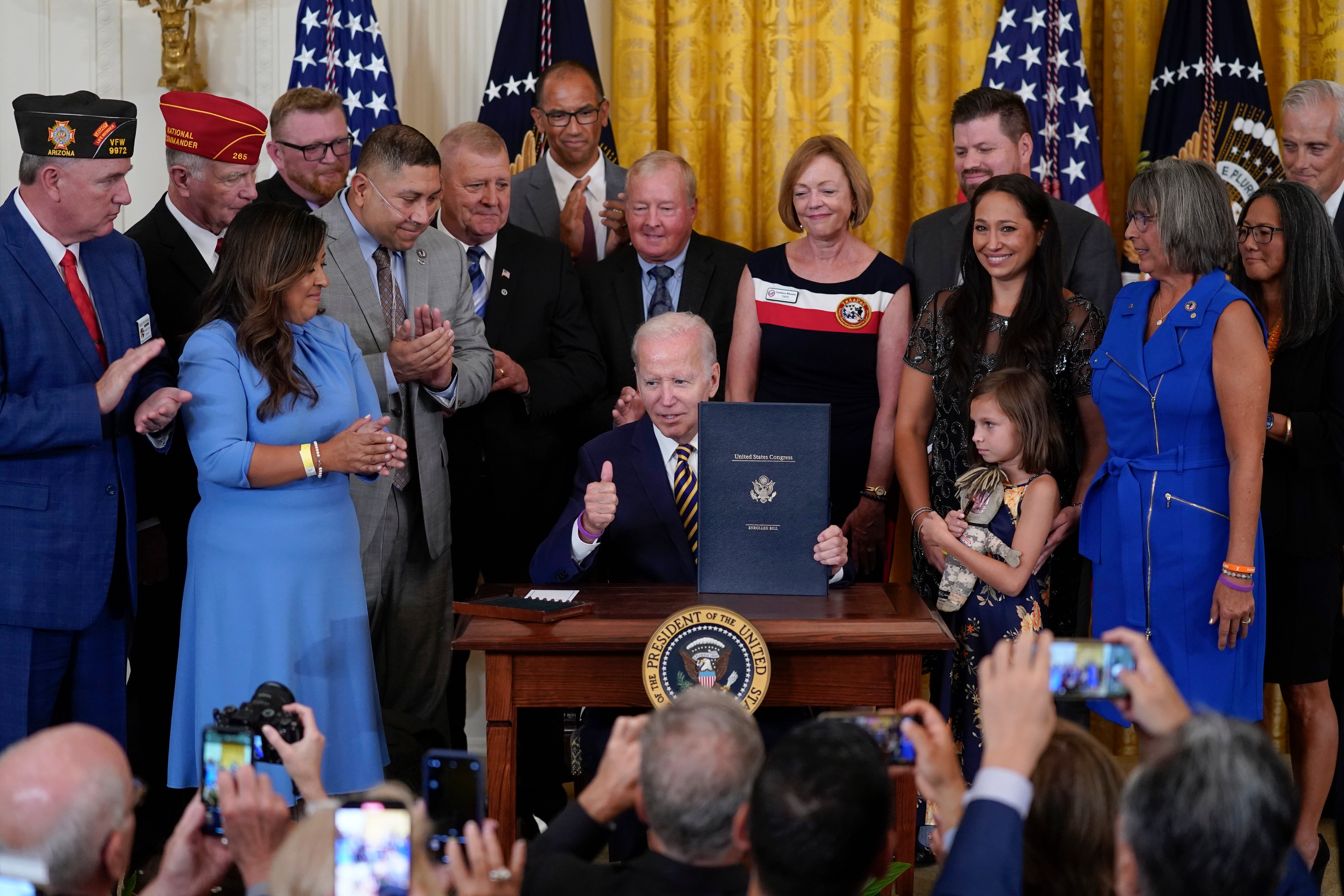In early 2021, when Denis McDonough was sworn in as the Veterans Affairs secretary, he promised to make the department more inclusive, more welcoming and more user-friendly for veterans.
Now, nearly two years later, McDonough says the VA is closer to those goals — but not there just yet.
“One priority is keeping the veteran at the center of all we’re doing,” he said last week in an interview with Military Times. “Are we building our programming and our support, our care and benefits into the veteran’s life, or are we making the veteran fit into us? I’d say on that, things are changing, but there’s still a long way to go.”
McDonough did say, however, that he has been pleased with efforts to make department decisions more transparent, both to the public and Congress.
RELATED

“I think that one of the big issues with VA is to make sure that the vets trust us,” he said. “So, we have a lot of tools to try to make sure we can track and we can get feedback from vets. But the most important thing to trust, I believe, is transparency.
“I hope that [the public] believes that they have seen a change in VA on that, with monthly press conferences, with us making sure that we’re inviting in our veterans service organizations, inviting in veterans … and bringing the inspector general in, making sure that we’re working very closely with our accountability and oversight mechanisms.”
In the interview, McDonough also discussed current challenges for the department and his goals for improvements in coming months.
Portions of the interview have been edited for length and clarity
Military Times: Coming out of the COVID pandemic, what is your concern now with morale levels and staff burnout at VA health centers?
McDonough: I’m worried about it. I think everybody in healthcare is worried about it. I’m worried about it also at the National Cemetery Administration. I’m worried about it at the benefits administration.
But you know, so is everybody else. We, as a country, have all come through the pandemic. And people feel isolated, people feel tired, people feel scared.
The thing that excites me is that VA, I think, is leading the way in and identifying ways to address that potential burden. We start from a position that we are accountable to the veteran. We’re not accountable to some bean counter at some health insurance companies. That doesn’t happen here.
We want to make sure that burnout doesn’t come from administrative burden. A nurse told me, “I signed up at VA to nurse veterans. I didn’t sign up at VA to nurse the chart.” I thought that was a pretty powerful concept.
We have to make sure our clinicians are practicing at the top of their license. That means they’re taking care of vets, they’re not just doing paperwork. So we’re working on that, too.
Congress has been very responsive to this. The president has been extraordinarily responsive to this. So, when we’ve needed additional resources, we’re getting them.
We’ve seen this in particular in the new law as it relates to toxic exposure. We have a whole section of that law that gives us additional authority, additional resources to invest in our workforce.
You’ve focused plenty of resources on veteran issues over the last year. Do you worry that could change in the future, especially if control of Congress changes political hands?
I find that we do not lack for attention or investment from our friends on Capitol Hill.
And in terms of our partners in the administration, I’ll tell you what — for the first time in a long time, we have a military family at the White House. We are not lacking for attention from the president, or the first lady, or the vice president. The president has a way of underscoring his seriousness on these matters.
The president has a lot on his plate right now. How much communication do you have with him on these issues?
We have regular communication with the president, with the Joining Forces team, with the Domestic Policy Council and with the chief of staff. They all hold us to account, but especially the president and the first lady.
It’s because they understand what’s involved here, in terms of what families have given, and they want to make sure that we’re treating our vets as well as the vets have treated us.
RELATED

Are you worried at all about the potential politicization and even weaponization of some veterans issues with a Republican Congress, especially as we enter a presidential election cycle?
We still don’t know what precisely happened [in the midterm elections]. But the question for us is always going to be, “What is the basis on which we operate with Capitol Hill?” And the basis on which we operate will be full transparency.
We operate under a no surprises posture, and we’ll obviously explain the decisions we make, whether that’s on this emergency effort to ensure that the 300,000 women veterans of childbearing age have confidence that they can get the reproductive care that they need from a provider they trust at VA, or whether it’s our execution of the new law as it relates to toxic exposure.
I think Congress is going to have questions, and they’re right to ask them. We’ll answer them. But for us, this is all about execution on behalf of the veterans. And as long as we continue to operate in that way, I have every confidence that we’ll have the resources we need to carry out this important mission.
You haven’t finalized changes on the VA motto to gender-neutral language, or changes to gender affirmation surgery for transgender veterans. Do you think you can make progress on these sort of controversial topics if there is a Republican-controlled Congress?
We don’t do anything in secret here. There’s nothing classified. Everything we do is in the interest of the veteran, funded by the American people. Congress has every right to know what we’re doing with the money.
And so, that’s why I’ve put out there that we’re going to change the motto. How we do it is something that we’re working through, but we’re going to change it. It’s fully within our authority to do that, and we’ll do it.
As it relates to the provision of gender confirming surgery, we made an announcement last year informed by the unanimous request of our healthcare governing board. Our healthcare experts said that [it’s needed] for a lot of reasons, particularly the fact that people who struggle with gender dysphoria and are not treated with a full suite of care suffer from intense depression [and] suicidal ideation at a very high level.
In light of that, this step to move towards gender confirmation surgery is in the interests of those veterans who are confronting those questions. What we’ve said is that our next step will be publication of a proposed rule.
How we carry this out will be handled in the light of day, fully transparently, inviting anybody who has a view to share their view.
But do you feel you’ve run out of time already on those issues? Why is the motto change taking so long?
It’s a fair question. Do I feel the pressure of time? I feel a pressure every day, which is getting our veterans timely access to world-class care. It’s getting our veterans the benefits that they deserve, that they have earned, in a timely, transparent way. And it’s ensuring that every veteran has access to the dignified final resting place that they deserve.
Gen. James Jones [former national security adviser for President Barack Obama] … has a saying: “Sometimes, if you want it bad, you’ll get it bad.” So, on the motto, my view is that I want it right.
How you make policy, how you make change and the change that you implement are two sides of the same coin.
We’re doing this in a way that’s informed by consultation with veterans. We’re doing this in a way that will get us the right outcome. And we’re doing this as one part of a much larger effort to make sure that every visitor feels welcome at VAs across the country. Changing the motto is an important part of that, but it’s not the only part of it.
We are working every day on each of the aspects of that policy, making sure that the fastest growing group of our veterans — women veterans — know that they can safely be welcomed at any VA [medical facility], VA regional office, or any VA cemetery across the country.
On the Promise to Address Comprehensive Toxics Act, you’ve promised that VA is going to be able to handle the benefits and healthcare claims. What are you putting in place now for the next Agent Orange, the next burn pits, the next unknown illness that’s going to come up? Can you put systems in place now so that we don’t see those same frustrations of waiting for recognition?
It’s a question that we spend a lot of time thinking about. The thing that we’re really trying to manifest is that at VA, there should be many front doors. Wherever a veteran comes for VA care, or comes in for benefits … wherever that veteran enters, she gets the care that she needs. She gets the benefits that she’s earned.
That’s the way, ultimately, we’re going to be in a position to know that a veteran doesn’t have to advocate for himself — when we operate not as independent silos, but as an enterprise. [If] veterans come into our care, and they’re showing a propensity to asthma, the Veterans Health Administration can say to the Veterans Benefits Administration that this looks like an issue.
That’s got to be the goal for us. Because until now, too often it’s a veteran or a journalist who was reporting about what veterans are experiencing before we’re reacting. We should be the ones who are the number one advocate for the vets.
And I believe, because of the way we’re structuring ourselves to be veteran-centered, because of the tools we have from Congress in this new law — to include our Burn Pits Center of Excellence — and when we get the trust of veterans to come and enroll, then we will be vets’ best advocates. That’s our challenge.
The electronic health records rollout has gone through multiple delays. Are we at a point where there have been too many delays and too many problems with this?
We’re a data driven operation here. If we get to that point, it’s going to be because of what we learned from the data, rather than what I learned from my emotions.
There have been many times in this office where I get very emotional about this. I get really pissed off, to be mildly crude, because this is a massive investment of taxpayer resources. And the program and the technology is not living up to the billing. Our vets deserve better.
But this is not going to be a decision that I arrive at through my emotion — which can sometimes get the best of me — but rather, through data. And if it’s not working for vets, we’re not going to do it. But we’re also not just going to throw it away because we get tired.
We’re going to stay on this thing to make it work because the idea is so profoundly in the national interest. But if it’s not workable, we’re not going to just spin our wheels.
The average shelf life for VA secretaries is right around two years. We’re just through the midterms here. Are you starting to think about leaving the administration?
The direct answer to your question is no. I’m not thinking about leaving.
The more nuanced answer to the question is, talk to the president, and then ask Congress. I’ve tried to invest in the relationships up there, no matter what party, because we’re all in this thing together. Nobody asked the vets if they’re Republicans or Democrats. And if I lose their confidence, that will be a problem.
What has surprised you about VA and veterans in your time as secretary?
I think I knew the hard stuff. You know, this is a big organization, you’re sitting in Washington, are people out there even listening to you? Being a leader that can help lead a big, dispersed organization, that’s hard, right? I think I knew that.
But actually feeling it every day? And I have to earn the respect of my workforce, too. So, that’s been hard. And how do I earn their respect? By getting out on the road, by making sure that they see that I’m as invested in this mission as they are. These are amazing professionals who could work a lot of places for a lot more money.
The second thing is I’ve been in every corner of the country now. In every corner, there’s something interesting happening, and it’s vets who are doing it. I know that now because I’m looking for events. And a lot of these vets doing this stuff aren’t trying to be seen as vets. That’s a really cool thing. That’s a super empowering thing. And that’s the best part of the job.
By the way, a lot of those super interesting vets doing really cool stuff? They also happen to be VA employees. And when you look around, and you ask yourself about this national experiment, to form a more perfect union, in every turn, who’s the fulcrum on which we’re making a more perfect union? It’s veterans.
To be a part of that, from this job as a non-vet, it’s a blessing that I take very seriously.
Leo covers Congress, Veterans Affairs and the White House for Military Times. He has covered Washington, D.C. since 2004, focusing on military personnel and veterans policies. His work has earned numerous honors, including a 2009 Polk award, a 2010 National Headliner Award, the IAVA Leadership in Journalism award and the VFW News Media award.





